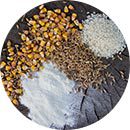People who want to maintain their health and well-being may face substantial hurdles if they have diabetes and allergies. Diabetes, a disease that impairs the body’s capacity to control blood sugar levels, and allergies, which can cause a variety of symptoms when particular foods or environmental factors are consumed, both need careful management and attention. This blog will explore the complex interaction between allergies and diabetes, with an emphasis on how to properly manage food and environmental allergens. People can live healthier lives while successfully addressing the problems brought on by diabetes and allergies by developing a thorough grasp of the relationships between these disorders and implementing suitable methods. Numerous similarities and risk factors exist between allergies and diabetes. According to studies, people who have diabetes may be more prone to allergies since their immune systems may be affected differently by the disease.
- Recognising How Diabetes and Allergies Are Related:
Some warning signs and connections between diabetes and allergies exist. According to research, having allergies may be more likely to develop in those with diabetes. Aside from that, diabetes can alter how the immune system reacts, perhaps making allergic reactions more likely. As the body’s reaction to an allergy trigger can cause changes in glucose levels, allergies can also have an impact on diabetics’ blood sugar levels. Effective management of both illnesses depends on being aware of this link.
- Controlling Allergies to Food with Diabetes:
Knowing your allergens and triggers is essential if you have diabetes and food allergies. It’s crucial to carefully read food labels and be aware of any hidden allergies when managing these disorders. It’s crucial to create a customized meal plan that takes allergy avoidance and dietary limitations for diabetes into account. When treating food allergies and controlling blood sugar levels at the same time, maintaining a balanced carbohydrate intake becomes essential. Maintaining a nutritious and secure diet also requires learning how to navigate social situations involving food and dining out.
- Atmospheric allergies and diabetes:
People with diabetes may experience additional difficulties as a result of environmental allergies. Allergies can be brought on by common environmental allergens such as dust mites, pollen, pet dander, and mold. It’s crucial to limit exposure to these allergies at home and work. Environmental allergies can be managed with routine cleaning and upkeep, such as frequent vacuuming, the use of hypoallergenic bedding, and the closing of windows during peak pollen seasons. The impact of seasonal allergies on blood sugar regulation should also be taken into account.
- Working together with medical professionals:
Collaboration with medical specialists is necessary for the management of allergies and diabetes. It is necessary to regularly check and assess allergic reactions and blood sugar levels. Healthcare professionals can provide advice on drugs and possible courses of therapy for both diseases. Effective management of diabetes and allergies can be achieved with the help of dietitians and allergists, who can offer insightful advice and customized suggestions.
- Behavioral Approaches for Diabetes and Allergies:
For people with diabetes and allergies, adopting good lifestyle practices is crucial. Both diseases can be improved with regular exercise. Utilizing stress-reduction strategies like awareness and relaxation exercises can lower the likelihood of allergic reactions and improve blood sugar control. To effectively manage these illnesses, it is crucial to maintain a healthy diet, drink plenty of water, keep an eye on your blood sugar levels, and pay attention to any allergy reactions. Creating a support system and asking for help from peers can offer emotional support as well as helpful advice for managing both diseases.
- Emergency Preparations:
Having diabetes and allergies makes emergency preparedness essential. It’s critical to recognize the symptoms of anaphylaxis, a severe allergic reaction, and problems associated with diabetes. It is crucial to carry the required prescriptions and identification, including a medical alert bracelet and an epinephrine auto-injector. It can be helpful for people and their loved ones to prepare an emergency action plan that specifies what to do in case of an allergic reaction or a diabetes-related emergency.
Conclusion
Managing one’s health while having diabetes and allergies calls for a proactive and all-encompassing strategy. The effect of allergens on blood sugar levels is also notable because allergic reactions can interfere with a person’s ability to regulate their blood sugar in people with diabetes, necessitating cautious management and monitoring. People can take action to properly manage their allergies to food and environment-related allergies by becoming aware of the relationships between these ailments. To effectively manage diabetes and allergies, it’s important to make individualized food plans, reduce exposure to allergens, work with healthcare professionals, adopt healthy lifestyle practices, and be ready for emergencies. People can overcome difficulties and lead full lives while managing both diseases with the right care and diligence.
 English
English 

































